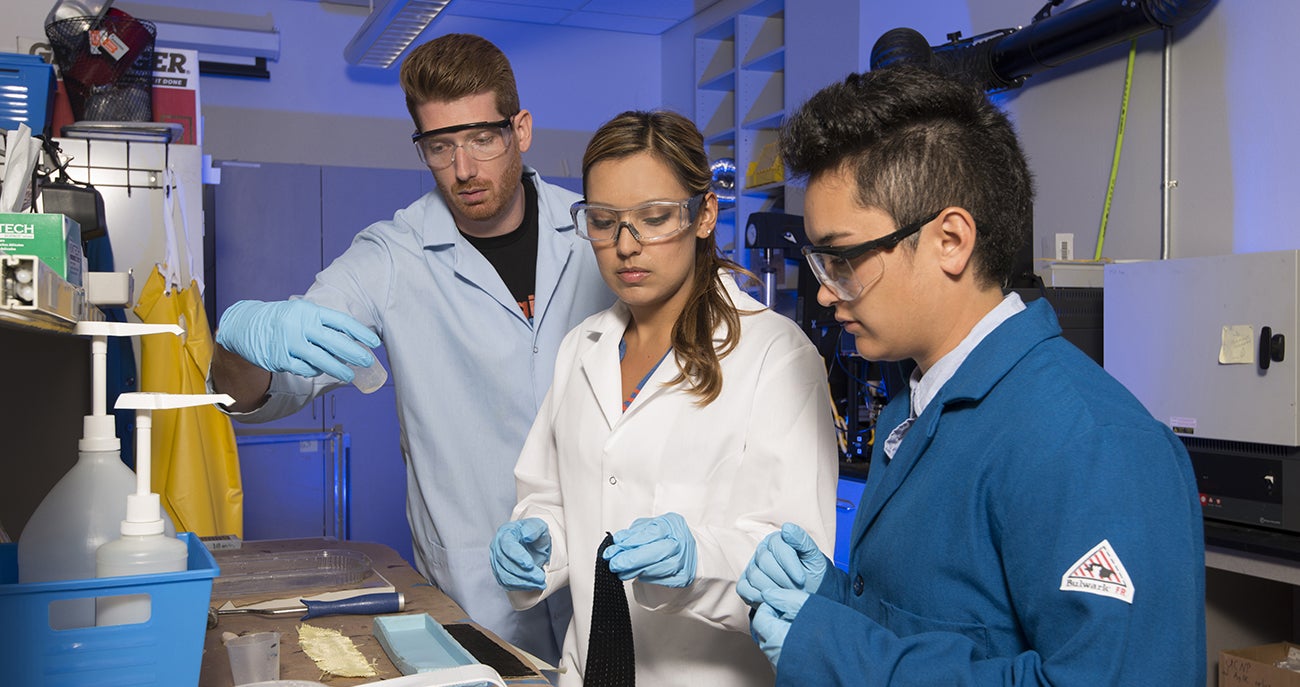
All PhD and MS students in Materials Science and Engineering are fully funded through Graduate Research Assistantships, Fellowships, or through external employers.
See the following sections for open Graduate Research Assistant (GRA) positions and opportunities.
Rotation GRA Opportunity
- Purpose: To identify a research supervisor and research project to complete doctoral research.
- Research Lab: Lab to be determined. This is for a rotation position – see position description bullet.
- Position Supervisor: Graduate Faculty in Materials Science & Engineering. Specific faculty involved will be determined according to project and funding availability.
- Position Description: This position is for a non-advisor specific graduate research assistantship within the Interdisciplinary Graduate Program in the Micron School of Materials Science & Engineering. Candidates accepted to this position will be supported by the program, and expected to complete rotations through one or more research groups within the first year of the graduate program. The goal of these rotations is to identify a best-fit for both the student and the faculty mentor to support a successful graduate experience.
- Preferred Qualifications: Strong candidates will be excited and prepared to excel in graduate school. Must be able to problem solve and self-motivate. Broad interest areas within the field of materials science and engineering are preferred. Students from all STEM backgrounds will be considered. Must be admitted to the MSE Interdisciplinary Ph.D. Program.
- Interested? Email msegrad@boisestate.edu
Download Rotation GRA Opportunity (no specific advisor) PDF
Smart Materials and Systems Laboratory (Dr. Zhangxian Deng)
- Research Lab: Smart Materials and Systems Laboratory
- Position Supervisor: Zhangxian Deng (zhangxiandeng@boisestate.edu)
- Lab Overview: Smart materials have much to offer over traditional “dumb” materials, since their properties vary controllably and reversibly because of stress, temperature, electrical, magnetic, or other external stimuli. Our lab specifically focuses on magnetostrictive, piezoelectric, and shape memory materials. By leveraging the synergies of additive manufacturing, system prototyping, and multiphysics modeling, our lab has successfully tackled challenging engineering problems from INL, NASA, and local industries. More details are available at https://zhangxiandeng.weebly.com/.
- Position Description: The SMSL seeks self-motivated Ph.D. students to investigate one of the following research problems: (1) high temperature and radiation tolerant ultrasonic transducers for advanced nuclear reactors, (2) flexible and morphing smart electronics for outer space exploration, and (3) functional smart structures for biomedical applications. A non-exhaustive list of research activities are as follows:
- Additive Manufacturing of Smart Materials: synthesize nanoparticle colloid inks or plastic filaments for 3D printing; use an nScrypt micro-dispenser or 3D printer to fabricate smart material thin films; postprocess (e.g., sintering, poling, or annealing) printed films; use a mechanical load frame, magnetometer, electrical impedance analyzer to characterize physical properties.
- Smart System Prototyping and Validation: devise flexible sensors, energy harvesters, morphing structures, or ultrasonic transducers; design electrical circuits for signal processing and energy scavenging; customize experimental setups to validate the functionality of smart system prototypes.
- Multiphysics Modeling: develop constitutive models that can capture the multiphysics properties of smart materials; develop finite element frameworks for smart system prototypes.
- Preferred Qualifications: Applicants must have a B.S. or M.S. degree in mechanical engineering, materials science, electrical engineering, physics, or a related degree with relevant coursework. Those with prior experience prototyping mechanical or electrical systems, coding experience (e.g., Matlab, LabVIEW, COMSOL, Abaqus, Python), and/or a demonstrable effectiveness in disseminating scientific results (e.g., publications or conference presentations) are encouraged to apply.
- Interested? Email msegrad@boisestate.edu
Download Smart Materials and Systems Laboratory (Dr. Zhangxian Deng) PDF
Functional Ceramics Lab – Perovskite PV’s (Dr. Rick Ubic)
- Research Lab: Functional Ceramics
- Position Supervisor: Rick Ubic, PhD (rickubic@boisestate.edu)
- Lab Overview: Our main focus is the crystallography and structural characterization of functional ceramics including microwave dielectrics, ferroelectrics, and ionic conductors, with a special emphasis on the crystal chemistry of perovskite materials including hybrid organic-inorganic perovskites for photovoltaic applications.
- Position Description: The Functional Ceramics lab is seeking a Ph.D. student to undertake the synthesis of perovskite solar cells. Advances in hybrid organic-inorganic ceramics have shown lead halide perovskites like (CH3NH3)PbI3 to be promising candidates for thin-film photovoltaics, allowing low-cost synthesis of solar cells. Efficiency values of ~20% now commonly reported put these materials in the same league as silicon. The perovskite is the optically-active layer in such devices, akin to the electron-donor material in heterojunction solar cells, absorbing light and injecting electrons (and holes) into conducting media. Other layers assist with charge separation; however, in order for perovskite photovoltaics to become a commercial success, two key barriers must still be overcome: limited stability and environmental toxicity.
- Preferred Qualifications: We are looking for a highly motivated student to take on this multidisciplinary project involving materials science, chemistry, and physics. Interested students are encouraged to reach out to Dr. Ubic. Experience with ceramic processing and/or thin-film synthesis would be an advantage but is not necessary.
Download Functional Ceramics Lab – Perovskite PV’s (Dr. Rick Ubic) PDF